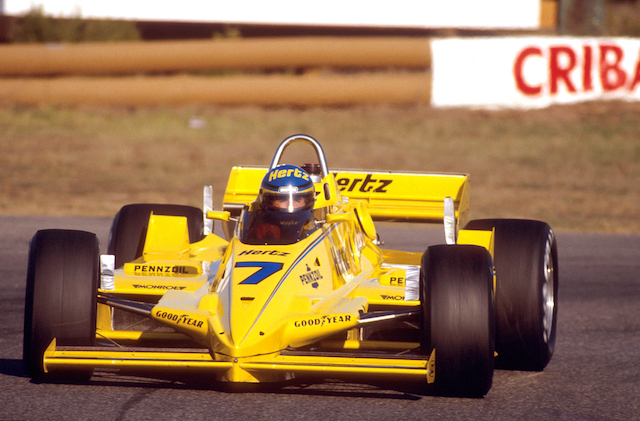Diversity of thought and the concept of "free."
 Tuesday, February 12, 2013 at 09:19AM
Tuesday, February 12, 2013 at 09:19AM By Peter M. De Lorenzo
Detroit. That the sport of auto racing is on a precarious cliff of indifference, or worse, is something that can be debated endlessly, but there's no denying that there's a shift going on - a palpable decline of general interest - that is growing with each passing season. Am I talking about the people who visit this website as part of this shift? For the most part, no. But I have noticed more and more emails from our racing enthusiast readers lamenting what racing has become.
To be truthful, racing has been an acquired taste since the first race took place. There are people throughout the last century and well into this one who enjoyed savoring every moment of their particular branch of the sport, from drag racing and NASCAR to road racing and everything in between. And over that same period racing has drawn interest from the broader populace as well, but that interest has spiked and waned like a roller-coaster.
During NASCAR's modern era heyday (roughly 2003-2007), it was on the cover of stick-and-ball media touchstones like Sports Illustrated with the headline blaring "NASCAR Nation!" That seems so long ago, doesn't it? Make no mistake, NASCAR is still the straw that stirs the drink in American motorsport - and by a long shot, I might add - in terms of manufacturer interest, advertising support from corporate America, fan attendance, etc., but even the most ardent NASCAR supporters, including people within NASCAR itself, are extremely concerned about the future of the sport, because the numbers are trending downward.
But this column isn't about NASCAR. It's about the general decline of interest in the sport of racing itself across the board. Even the hard-core racing enthusiasts out there are growing disgruntled, and a general ennui seems to have set in. Most of the readers who express their displeasure with racing do so in comments like these: "It's the sameness that really bothers me. There's too much repetitiveness and an overall lack of excitement." Or, "I dislike spec racing intensely. Where's the creativity? Where's the mechanical diversity?" Or, "I stopped following racing like I used to. I watch maybe five races a year on TV from start to finish. The rest of the time I tune in here and there."
I believe some of it lies in the fact that racing enthusiasts of a certain age grew up in the 60s when racing was clearly on an upward trajectory. Everything was newer and faster than the year before and the sport, despite its penchant for killing drivers every year, was the hottest thing going.
But then things changed.
Why? Technology swallowed the sport whole. You can almost mark that change in a few developments and two of those instances come to mind for me quite clearly. When the Porsche 917 Can-Am car showed up it decimated the series (this was after the SCCA, in their inevitable wisdom, banned the Chaparral 2J "sucker" car, which put paid to diversity of thought in the Can-Am series once and for all). No other manufacturer was ready to challenge the Porsche Turbos and its star lineup of entrant Roger Penske and driver Mark Donohue, so the series faded into the history books. The other was when the speeds at the Indianapolis Motor Speedway climbed to such a degree that instead of embracing technical diversity like it did during the era that witnessed the marvelous march to 200 mph lap speeds, The Speedway launched the idea of "managed" competition, and the spec car era was born.
And for the most part the sport has been on a decline in this country ever since. Sure there have been spikes in enthusiasm (the heyday of CART, for instance), but for the most part we've seen the diversity of thought in the sport fall by the wayside in favor of the brightest minds gaming the spec car rule book by a fraction here and there.
Why do you think Ben Bowlby's DeltaWing drew so much attention? It was different, yes, but there was far more to it than that. For many enthusiasts it represented a throwback to a more dynamic era, when diversity of thought and ragged-edge creativity ruled the day. It didn't matter whether or not the DeltaWing was their particular cup of racing tea, they applauded the thinking and the effort and the cojones to march to a different drummer that it represented.
Today we happen to be at a point where the sport of Indy car racing is at a crossroads, but then again that particular segment of the sport has been on a downward spiral for a long time. But it's different now because the sense of urgency brought on by the general decline in interest in racing in this country is being ignored, and some very smart racing people whom I have the utmost respect for have chosen to whistle past the graveyard, thinking that they're somehow immune to the prevailing winds.
I wish that were the case.
The very first "Fumes" column that I wrote back on June 1, 1999, mentioned some of the very same themes that I'm talking about today. I even mentioned the idea of developing hydrogen power at The Speedway, and eight years later proposed the Hydrogen Electric Racing Federation to a stellar group of racing industry people. And predictably, it went nowhere. It required too much money. And there was no sense of urgency whatsoever, as in, why should we invest in The Future when we have pressing issues right now?
Well, the time for a sense of urgency is long past. To save Indy car racing - and I mean save Indy car racing - the leaders of the sport have to work in conjunction with the manufacturers to go down a new path. And that new path must revolve around the diversity of thought and the concept of "free."
As I've said repeatedly over the last several years, the rulebook for the Indianapolis 500 and all of Indy car-style racing needs to be thrown out. And in its place I suggest a new rulebook comprising three things: 1. A dimensional box will be created that the racing machine must fit in. 2. A highly efficient fuel usage formula will be instituted that takes into account every possible propulsion option. 3. Everything else is "free."
Imagine the possibilities. Imagine the concept of "free." Imagine what the Ben Bowlbys of the world - and the budding Smokey Yunicks that we haven't even heard from yet, for that matter - could do with a minimalist rules package like that.
Racing in this country is showing signs of deep decline and worse, the overall interest in the sport seems to be slowly but surely fading with each passing year.
The sport of Indy car racing cannot possibly survive this slow march to oblivion, as it barely registers on the media radar screens now (except for the Indy 500, of course).
I sincerely hope that powers that be in the sport of Indy car racing take heed and put plans into motion for a new beginning for the sport.
Because if they don't, I don't think the sport of Indy car racing will exist by 2020.
The Indianapolis 500 may survive as an invitational event, but the series as a whole will die.
Publisher's Note: As part of our continuing series celebrating the "Glory Days" of racing, we're proud to present another noteworthy image from the Ford Racing Archives. - PMD
 (Courtesy of the Ford Racing Archives and Wieck Media)
(Courtesy of the Ford Racing Archives and Wieck Media)
Monterey, California, October 23, 1983. Al Unser (No. 7 Penske Racing Hertz Penske/Cosworth) at speed during the last race of the season at Laguna Seca. He would win the CART PPG Championship that year, although he would suffer a DNF in the race with a broken half-shaft. Teo Fabi (No. 33 Forsythe Racing Skoal Bandit March/Cosworth) would win the Cribari Wines 300k from the pole, Mario Andretti (No. 3 Newman Haas Racing Budweiser Lola/Cosworth) would finish second and Chip Ganassi (No. 60 Pat Patrick Racing STP Oil Treatment Wildcat/Cosworth) would finish third. Watch a cool video of that race here.
Publisher's Note: Like these Ford racing photos? Check out www.fordimages.com. Be forewarned, however, because you won't be able to go there and not order something. - PMD




